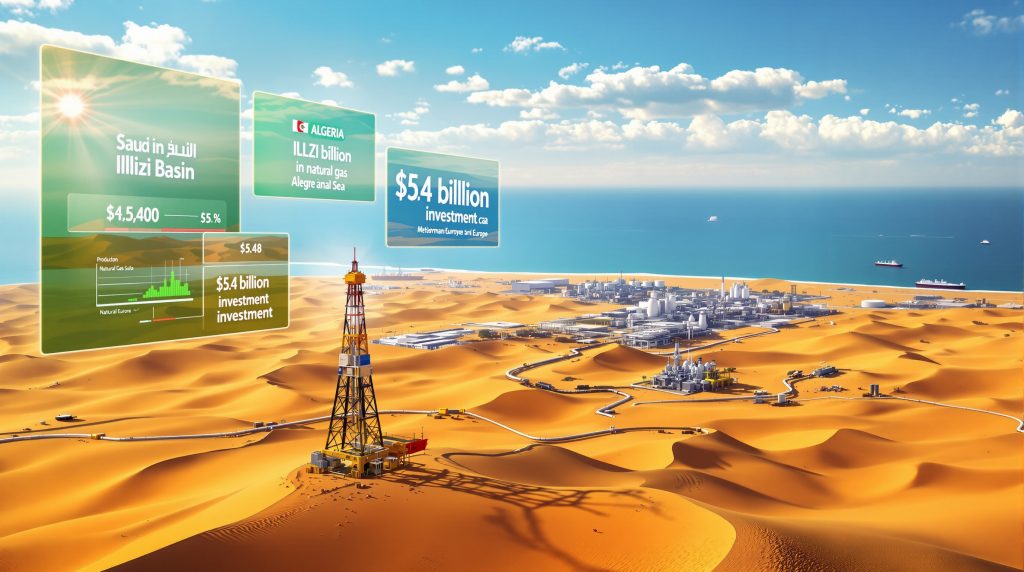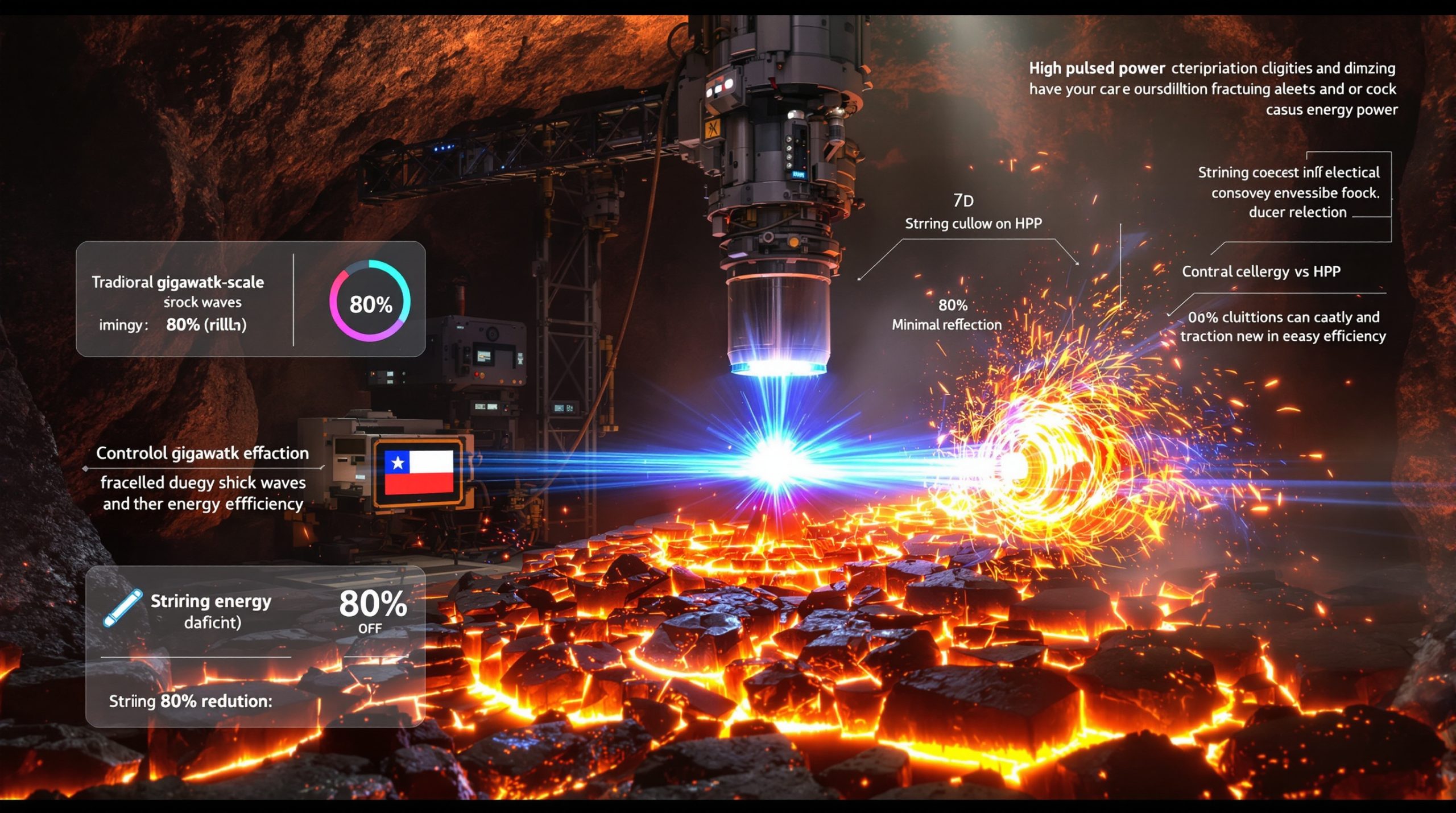Understanding the Sonatrach-Midad Energy Partnership: A Strategic $5.4 Billion Oil and Gas Deal
The landmark partnership between Algeria's state-owned Sonatrach and Saudi Arabia's Midad Energy marks a transformative development in North African energy production. This production-sharing agreement, valued at $5.4 billion, represents one of the most significant energy investments in the region in recent years and carries substantial implications for both countries and global energy markets.
Scope of the Sonatrach-Midad Energy Agreement
The partnership between Algeria's Sonatrach and Saudi Arabia's Midad Energy encompasses exploration and development activities in Algeria's resource-rich Illizi Basin. Specifically, the agreement targets the Illizi South perimeter, located approximately 100 kilometers south of In Amenas near the Libyan border.
This comprehensive agreement includes several key elements:
- A total investment valued at $5.4 billion
- A 30-year contract duration with a potential 10-year extension option
- A seven-year dedicated exploration phase
- Complete financial backing from Midad Energy North Africa
- Exploration funding allocation of $288 million
The contract signing, attended by high-ranking officials from both countries, underscores the strategic importance of this cross-border energy collaboration within the broader context of Algeria's energy sector revitalization efforts.
According to Algeria's Hydrocarbon Law No. 19-13, enacted in December 2019, production-sharing contracts allow foreign companies to participate in exploration and production activities while Sonatrach maintains majority control. Under this framework, foreign partners finance exploration and development activities, with production shared based on cost recovery and profit oil mechanisms, while Sonatrach retains minimum 51% participation in the production phase.
The Illizi Basin has previously attracted significant international investment. In January 2023, Sonatrach signed a $1.35 billion partnership with Italy's Eni for development in the Zemoul El Kbar area, also located in the Illizi Basin, demonstrating the region's continued attractiveness to international energy companies.
Production Impact and Resource Development
The agreement establishes ambitious production targets that will significantly enhance Algeria's hydrocarbon output capabilities. According to Sonatrach's official announcement, the project is expected to yield substantial production volumes over the contract lifespan:
| Production Metric | Projected Volume |
|---|---|
| Total Production (Contract Lifespan) | 993 million barrels of oil equivalent |
| Natural Gas Component | 125 billion cubic meters |
| Exploration Period | 7 years |
| Development & Production Phase | 23+ years |
To put these figures in context, according to OPEC's Monthly Oil Market Report (September 2025), Algeria's crude oil production averaged approximately 901,000 barrels per day in 2024. For natural gas, Algeria produced approximately 100 billion cubic meters annually in recent years based on International Energy Agency data.
The U.S. Energy Information Administration reports that Algeria holds proven oil reserves of approximately 12.2 billion barrels and natural gas reserves of 4.5 trillion cubic meters (159 trillion cubic feet) as of January 2024, ranking it among Africa's top hydrocarbon holders.
The technical implementation strategy incorporates:
- Advanced exploration technologies for accurate resource assessment
- Modern drilling and extraction methodologies
- Digital monitoring systems for operational efficiency
- Environmental compliance measures aligned with Algerian regulations
Production is expected to commence following the seven-year exploration phase, assuming commercially viable discoveries. The development phase will span at least 23 years, with potential for extension.
Strategic Importance of the Partnership
Algeria's Energy Sector Transformation
This partnership represents a cornerstone in Algeria's broader energy strategy. According to the Algeria Press Service, the country plans to attract $60 billion in energy sector investments over the next five years, focusing on:
- Modernizing aging infrastructure to improve production efficiency
- Expanding exploration activities in both mature and frontier basins
- Strengthening Algeria's position as Africa's largest natural gas exporter
- Leveraging the country's estimated position as holder of the world's third-largest shale gas reserves
According to BP's Statistical Review of World Energy 2024, Algeria is Africa's largest natural gas exporter and the world's 10th largest natural gas exporter overall. In 2023, Algeria exported approximately 55 billion cubic meters of natural gas, with Europe receiving the majority.
The U.S. Energy Information Administration estimates Algeria possesses 707 trillion cubic feet of technically recoverable shale gas resources, ranking third globally after China and Argentina.
Saudi Arabia's International Energy Portfolio Expansion
For Midad Energy and Saudi Arabia, this agreement offers:
- Geographic diversification beyond Gulf region operations
- Access to North Africa's substantial hydrocarbon resources
- Strengthened bilateral economic ties with Algeria
- Enhanced presence in Mediterranean energy markets
- Strategic positioning in supplying European energy demands
Saudi Arabia, through entities like Midad Energy (a subsidiary of the Public Investment Fund), has been expanding investments beyond the Gulf region as part of Vision 2030, the kingdom's economic diversification blueprint launched in 2016. Furthermore, Saudi Arabia has been issuing Saudi exploration licenses to attract foreign investment in its own energy sector.
Market Conditions Influencing the Agreement
Global Energy Supply Dynamics
Several factors have created favorable conditions for this partnership, particularly in the European energy landscape. According to Eurostat data, EU imports of Russian pipeline gas fell from approximately 155 billion cubic meters in 2021 to approximately 80 billion cubic meters in 2022, and further declined to approximately 43 billion cubic meters in 2023, creating substantial demand for alternative suppliers.
The International Energy Agency's "Africa Energy Outlook 2024" notes that North African gas producers, particularly Algeria, are strategically positioned to supply European markets due to existing pipeline infrastructure and geographic proximity, offering delivery advantages over distant LNG suppliers.
Other factors influencing the agreement include:
- European efforts to reduce dependence on Russian natural gas supplies following the 2022 Ukraine invasion
- Increasing demand for reliable energy sources amid geopolitical uncertainties
- Growing recognition of Africa's importance in global energy security
- Rising investment in conventional energy resources despite energy transition pressures
- Strategic importance of maintaining diverse supply chains
Global LNG trade reached approximately 404 million tonnes in 2023, representing an 8% increase from 2022 as European nations increased LNG imports to offset reduced Russian pipeline gas supplies, according to the International Gas Union's "2024 World LNG Report."
Regional Economic Considerations
The agreement responds to specific regional economic factors:
- Algeria's need for foreign direct investment in its energy sector
- Employment generation potential in Algeria's eastern regions
- Technology transfer opportunities to enhance local capabilities
- Revenue diversification for both countries' economies
- Strengthened bilateral trade relations between Algeria and Saudi Arabia
The Sonatrach oil and gas deal with Midad Energy also comes at a time when oil price movements have been particularly volatile, influenced by global supply-demand imbalances and geopolitical tensions.
Comparative Analysis with Other Recent Energy Deals
This $5.4 billion agreement stands among the most significant recent energy investments in North Africa. For context, recent major regional energy deals include:
- Sonatrach's $1.35 billion partnership with Italy's Eni for the Zemoul El Kbar area in January 2023
- Sonatrach's $850 million contract with China's Sinopec for hydrocarbon development and exploration
- Egypt-ENI partnership: In June 2022, Italy's Eni committed to investing $2.5 billion to increase Egyptian gas production
- Libya-TotalEnergies agreement: In April 2024, TotalEnergies signed agreements worth over $1 billion for gas development in Libya
The scale and duration of this partnership demonstrate strong confidence in Algeria's hydrocarbon potential and regulatory environment, particularly following the introduction of more favorable terms under the 2019 hydrocarbon law.
Implementation Challenges
Operational and Technical Considerations
Several factors will require careful management throughout the project lifecycle:
- Complex geological formations requiring specialized exploration techniques
- Infrastructure development needs in remote operational areas
- Integration of operations with existing Sonatrach facilities
- Water management challenges in arid operational environments
- Skilled workforce development requirements
The Illizi region, particularly near the Libyan border, has faced security challenges in the past. The In Amenas hostage crisis in January 2013, where terrorists attacked a BP-operated gas facility, resulted in 40 deaths and highlighted security risks in the region.
The Illizi Basin's remote location requires substantial infrastructure development. As of 2024, Algeria's aging oil and gas infrastructure faces challenges, with some facilities dating back 40-50 years, according to the Oxford Institute for Energy Studies.
Regulatory and Market Factors
External factors that may influence project development include:
- Evolving hydrocarbon regulations under Algeria's Law n°19-13
- Global energy price fluctuations affecting investment returns
- Regional security considerations in border areas
- International climate policy impacts on long-term fossil fuel investments
- Competition from alternative energy suppliers to key markets
Algeria's 2019 hydrocarbon law introduced several favorable changes for foreign investors, including:
- Elimination of the requirement for Sonatrach to hold a minimum 51% stake in exploration partnerships (relaxed to production phase only)
- Reduced taxes and royalties for foreign investors
- Streamlined approval processes
- Maintained state ownership of hydrocarbon resources
Long-Term Implications for Energy Markets
Supply Chain Impacts
The successful implementation of this partnership will influence:
- Mediterranean and European natural gas supply security
- Competitive dynamics among North African energy exporters
- Algeria's market share in key European importing countries
- Development of associated infrastructure including pipelines and processing facilities
- Potential for expanded petrochemical production using project outputs
Algeria currently supplies Europe through two main pipelines:
- TransMed Pipeline: Capacity of 32.5 billion cubic meters per year (running through Tunisia and Italy)
- Medgaz Pipeline: Capacity of 10 billion cubic meters per year (direct to Spain)
In 2023, Algeria supplied approximately 11% of EU gas imports, down from about 13% in 2021, representing an opportunity for growth according to European Commission energy statistics.
Investment Climate Effects
This high-profile agreement may catalyze:
- Increased international investor interest in Algeria's energy sector
- Enhanced confidence in Algeria's production-sharing contract model
- Further Saudi investment in North African resource development
- Additional partnerships between national oil companies and international investors
- Modernization of Algeria's energy governance frameworks
The Sonatrach-Midad partnership could potentially offset concerns about oil price stagnation analysis by creating long-term production stability in a key region.
Future Regional Energy Cooperation
Bilateral Relationship Enhancement
The partnership establishes a framework for:
- Knowledge and technology sharing between Algerian and Saudi energy sectors
- Joint training and development programs for technical personnel
- Coordinated approaches to international energy market access
- Potential expansion into additional resource areas
- Collaborative research on enhanced recovery techniques
Both Algeria and Saudi Arabia are OPEC members. OPEC's 2024 World Oil Outlook emphasizes increased collaboration among member states for market stability and investment coordination. The OPEC production impact of decisions made by member countries continues to shape global oil markets.
Regional Energy Integration
Broader implications may include:
- Strengthened North African energy export coordination
- Enhanced cross-border infrastructure development
- Shared approaches to energy security challenges
- Coordinated responses to European energy demand shifts
- Joint initiatives for managing energy transition pressures
The African Energy Chamber's "State of African Energy 2024" report highlights that cross-border partnerships between African and Middle Eastern energy companies represent a growing trend, with total announced investments exceeding $25 billion across the continent in 2023-2024.
Environmental and Social Governance Aspects
Sustainability Considerations
While specific ESG provisions for this particular project have not been publicly detailed, Algeria's Environmental Protection Law (Law No. 03-10 of July 2003) requires environmental impact assessments for all major industrial projects, including mandatory public consultations.
Modern energy developments in the region typically integrate:
- Emissions monitoring and management systems
- Water conservation technologies for desert operations
- Waste management protocols aligned with international standards
- Rehabilitation planning for post-exploration activities
- Energy efficiency measures throughout operational processes
Saudi Arabia's Public Investment Fund (Midad Energy's parent) has committed to aligning investments with international ESG standards, including the UN Sustainable Development Goals.
Community Engagement
Successful implementation will require:
- Local workforce development programs
- Community investment initiatives in operational areas
- Transparent communication with regional stakeholders
- Cultural heritage protection measures
- Shared economic benefits with local communities
Additionally, this partnership may help Algeria maintain its energy production despite the ongoing US–China oil trade war which has created market uncertainties for many producer nations.
Key Questions About the Sonatrach-Midad Energy Partnership
When will production begin under this agreement?
Production timelines depend on exploration success, but initial development activities are expected to commence after the seven-year exploration phase, assuming commercially viable discoveries. This means commercial production would likely not begin before 2032.
How will revenues be shared between the partners?
While specific revenue-sharing formulas remain confidential, the production-sharing contract structure typically allocates production volumes based on investment contributions, operating costs, and Algeria's hydrocarbon regulations.
Will this partnership affect Algeria's OPEC production quotas?
New production will need to be managed within Algeria's OPEC commitments. As of June 2024, OPEC+ agreed to gradually phase out voluntary production cuts, with Algeria's baseline production set at approximately 1.0 million barrels per day.
What technologies will be deployed in the exploration phase?
The exploration program will likely utilize advanced seismic imaging, precision drilling technologies, and digital reservoir modeling to maximize discovery potential, though specific technical specifications have not been publicly disclosed.
How does this agreement relate to Algeria's energy transition goals?
While focused on hydrocarbon development, the partnership may incorporate provisions for minimizing environmental impacts and potentially exploring future carbon management technologies, aligning with broader industry trends toward more sustainable extraction practices.
Conclusion: A Transformative Partnership
The Sonatrach-Midad Energy partnership represents a significant development in North African energy production with far-reaching implications. By combining Sonatrach's regional expertise and resources with Midad Energy's financial backing and Saudi Arabia's energy sector knowledge, this collaboration has the potential to substantially enhance Algeria's hydrocarbon output while strengthening bilateral economic ties between the two nations.
As Europe continues to diversify its energy supplies away from Russian sources, Algeria stands to benefit from increased export opportunities, provided that the exploration phase yields the expected discoveries and production can be brought online efficiently. The success of this partnership could also encourage similar investments across the region, contributing to North Africa's growing importance in global energy markets.
Disclaimer: This analysis contains forward-looking statements and projections that involve risks and uncertainties. Actual production volumes, timelines, and economic impacts may differ from those projected based on exploration results, market conditions, regulatory changes, and other factors beyond the control of the partnership participants.
Want to Spot the Next Major Resource Discovery?
Don't miss out on potentially transformative ASX mineral discoveries like those of De Grey Mining and WA1 Resources. Visit Discovery Alert's discoveries page to learn how their proprietary Discovery IQ model delivers instant notifications on significant mineral finds, turning complex data into actionable investment opportunities.




